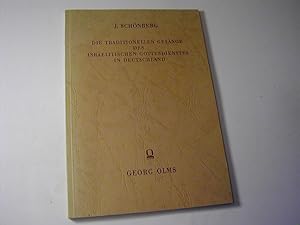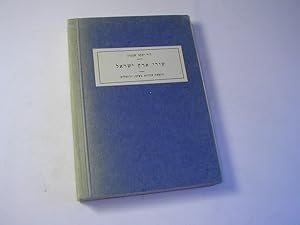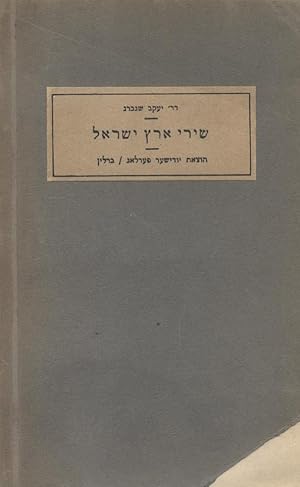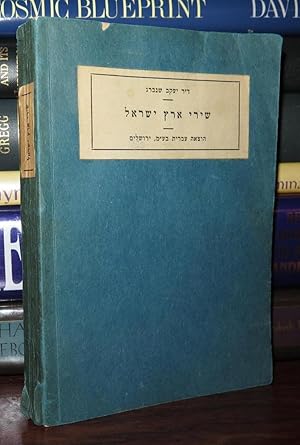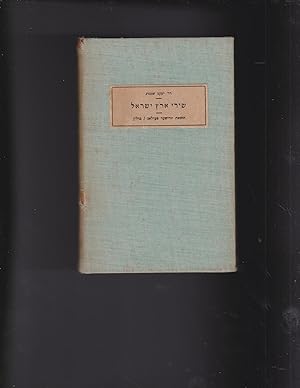SCHONBERG, JAKOB (12 risultati)
Tipo di articolo
- Tutti gli articoli
- Libri (12)
- Riviste e Giornali
- Fumetti
- Spartiti
- Arte, Stampe e Poster
- Fotografie
- Mappe
-
Manoscritti e
Collezionismo cartaceo
Condizioni
- Tutte
- Nuovi
- Antichi o usati
Legatura
Ulteriori caratteristiche
- Prima edizione (5)
- Copia autografata
- Sovraccoperta
- Con foto (5)
- No print on demand
Paese del venditore
Valutazione venditore
-
Die traditionellen Gesänge des israelitischen Gottesdienstes in Deutschland : Musikwiss. Untersuchung d. in A. Baers Baal T'fillah gesammelten Synagogengesänge
Editore: Georg Olms, 1971
ISBN 10: 3487040654ISBN 13: 9783487040653
Da: Antiquariat Fuchseck, Gammelshausen, Germania
Libro
Broschur. Condizione: Gut. 1971. - Reprograf. Nachdr. d. Ausg. Nürnberg 1926. XI, 94 Seiten.
Ulteriori offerte da altri venditori AbeBooks
Usato - A partire da EUR 14,95
-
Shire Erets-Yisra el : Histadrut ha-makabi be-Germanyah ve-Histadrut he-haluts be-Germanyah
Editore: Judischer Verlag, 1935
Paperback. Condizione: Good. 208 pp. slight library marks bookplate , Anthology of 230 Zionist songs. Includes unacc. Melodies. , music with romanized text, original edition, many popular in Germany during late 1930s 82113179 oclc.
-
Song-Book " Shirej Eretz Israel " Liederbuch, edited by Dr. Jakob Schönberg
Editore: Goldschmidt Verlag, Basel, 1947
Da: Antiquariat Fuchseck, Gammelshausen, Germania
Libro
TB. Condizione: Gut. Sonder-Auflage für Victor Goldschmidt Verlag Basel 1947. 208 Seiten. Dtsch. und Hebräisch. Besitzerstempel . Der Einband ist am Rücken gebleicht, das Papier etwas gebräunt.
-
[Liederbuch] Shirej Eretz Israel. Sonder-Auflage.
Da: Antiquariat Lorang, Bamberg, BY, Germania
Prima edizione
Victor Goldschmidt Verlag, Basel, 1947. Grauer Original-Karton, 208 Seiten, kl.8° (15 cm). Text in HEBRÄISCHER Sprache mit Erläuterungen in DEUTSCHER Sprache. Die erste Ausgabe erschien 1938 im Jüdischen Verlag in Berlin.- Einband mit kleinen Gebrauchsspuren, leicht nachgedunkelt und geringfügig lichtrandig, Papier etwas gebräunt, Buchblock sauber (also ohne Unterstreichungen & Randglossen). Sehr schönes Exemplar. [INTERNER HINWEIS - STANDORT Manesse-Regal].
-
Song-Book " Shirej Eretz Israel " Liederbuch, edited by Dr. Jakob Schönberg
Editore: Sonder-Auflage für Victor Goldschmidt Verlag Basel 1947, 1947
Da: Johann Peter Hebel Antiquariat, Lörrach, Germania
Prima edizione
Kart. geb. kl. 8° Einb. berieben sonst guter Zustand 208 p. S. enthält Lieder mit Musiknoten, Texte in deutsch und hebräisch First edition was published by Jüdischer Verlag Berlin 1938 / Copyright assigned by Hozaah Ivrith Ltd. New York 1945 mit Widmung auf Vs. Bl. von 5707 i.A. des M. K. L.
-
SCHIREI ERETZ ISRAEL ( Lieder des Landes Israel)
Editore: Hrs. V. Der Makkabi- Bewegung Deutschland und der Hechalutz Bewegung. Berlin, J?discher Vlg, 1935, 1935
Da: M.POLLAK ANTIQUARIAT Est.1899, ABA, ILAB, Tel-Aviv, Israele
Libro
Orig.broschiert. Condizione: Good. Lieder mit hebräischem Text und lateinischen Buchstaben. Rücken gebräunt, mit leichten Gebrauchsspuren und vereinzelten Stockflecken, sonst gutes und sauberes Exemplar .
-
SHIRE ERETS YISRA'EL: MI-TA'AM HISTADRUT HA-MAKABI BE-GERMANYAH VE-HISTADRUT HE-HALUTS BE-GERMANYA
Editore: Berlin; Yudisher Ferlag, 1935
Da: Dan Wyman Books, LLC, Brooklyn, NY, U.S.A.
Prima edizione
Original Wraps. 16mo. 208 pages. 17 cm. First edition. In Hebrew. Lyrics (romanized) --also printed as vocalized text in Hebrew script. Anthology of 230 zionist songs. Includes unacc. Melodies. Published by the Yudisher Ferlag of Berlin, under the auspices of Hechalutz and Maccabi World Union. "Jakob Schönberg was born in Fürth, Bavaria on September 8, 1900. His father, David Schönberg, was chazzan (cantor) at the Claus-synagoge in Fürth. . Schönberg apparently earned his living during Germany's Weimar Republic (1919-1933) as a pianist, music critic, conductor and composer. He wrote articles for the Nürnberger Zeitung and served as a musical consultant for Bavarian Radio in Munich. Bavarian Radio performed some of his orchestral compositions. He also worked in films as a "musical conductor and illustrator" and some of his film music was published by Schott's Söhne, Mainz, and Hawkes and Son, London. Schönberg was interested in composing instrumental music â " especially orchestral. His first orchestral work, Prelude Symphonique, premiered in 1923. . His style of composition took a decidedly Jewish turn after the Nazis took power in 1933, and Jewish musicians could no longer be employed by Germany's state-supported cultural institutions. In 1934 Schönberg transcribed the folk songs and dance tunes of several halutzim (pioneers) visiting Germany from Palestine. The following year he published Shire Erets Yisrael (Songs of the Land of Israel) , an anthology containing 230 Hebrew songs (Berlin: Jüdischer Verlag, 1935) . From this time until, at least, when he left Germany, these Israeli melodies would figure prominently in Schönberg's work. He set several of them for voice with piano and voice with flute and viola. His Suite für Orchester, 3 Sätze utilizes a Horra melody from the anthology. Schönberg's orchestral Horras appear to have been extremely popular in Nazi Germany, and were performed numerous times by the Jüdischer Kulturbünde between 1936 and 1938, in both Berlin and Frankfurt-am-Main" (Jakob Schonberg Collection; JTSA) . Subjects: Zionism - Songs and music. Songs, Hebrew - Palestine. Jews - Palestine - Music. OCLC lists 21 copies. Corner chipped on wrap, previous owners stamp inside back wrap, very light wear. Good + condition. (MUSIC-2-52).
-
SHIRE ERETS YISRA'EL, MI-TA'AM HISTADRUT HA-MAKABI BE-GERMANYAH VE-HISTADRUT HE-HALUTS BE-GERMANYAH [SHIRI ERETZ]
Editore: Jerusalem, 1947
Da: Dan Wyman Books, LLC, Brooklyn, NY, U.S.A.
Original Paper Wrappers with paper label as issued, 12mo, 208 pages, 17 cm. In Hebrew. Early post-war re-issue of this Nazi-era imprint, originally published by the Judischer Verlag in Berlin in 1935. Title translates as "Songs of Israel: Maccabi Union of Germany on behalf of the Pioneer Association in Germany. " In Hebrew. Lyrics (romanized) --also printed as vocalized text in Hebrew script. Anthology of 230 zionist songs. Includes unacc. Melodies. Published by the Yudisher Ferlag of Berlin, under the auspices of Hechalutz and Maccabi World Union. "Jakob Schönberg was born in Fürth, Bavaria on September 8, 1900. His father, David Schönberg, was chazzan (cantor) at the Claus-synagoge in Fürth. . Schönberg apparently earned his living during Germany's Weimar Republic (1919-1933) as a pianist, music critic, conductor and composer. He wrote articles for the Nürnberger Zeitung and served as a musical consultant for Bavarian Radio in Munich. Bavarian Radio performed some of his orchestral compositions. He also worked in films as a "musical conductor and illustrator" and some of his film music was published by Schott's Söhne, Mainz, and Hawkes and Son, London. Schönberg was interested in composing instrumental music â " especially orchestral. His first orchestral work, Prelude Symphonique, premiered in 1923. . His style of composition took a decidedly Jewish turn after the Nazis took power in 1933, and Jewish musicians could no longer be employed by Germany's state-supported cultural institutions. In 1934 Schönberg transcribed the folk songs and dance tunes of several halutzim (pioneers) visiting Germany from Palestine. The following year he published Shire Erets Yisrael (Songs of the Land of Israel) , an anthology containing 230 Hebrew songs (Berlin: Jüdischer Verlag, 1935) . From this time until, at least, when he left Germany, these Israeli melodies would figure prominently in Schönberg's work. He set several of them for voice with piano and voice with flute and viola. His Suite für Orchester, 3 Sätze utilizes a Horra melody from the anthology. Schönberg's orchestral Horras appear to have been extremely popular in Nazi Germany, and were performed numerous times by the Jüdischer Kulturbünde between 1936 and 1938, in both Berlin and Frankfurt-am-Main" (Jakob Schonberg Collection; JTSA) . Subjects: Zionism - Songs and music. Songs, Hebrew - Palestine. Jews - Palestine - Music. Lyrics (romanized) also printed as vocalized text in Hebrew script. Includes unaccompanied melodies. Light wear, Good Condition (Holo2-68-20A).
-
SHIREJ ERETZ ISRAEL
Editore: Jewish Publishing House, Jerusalem, 1947
Da: Rare Book Cellar, Pomona, NY, U.S.A.
Prima edizione
Softcover. First Edition Thus. Very Good- in wrappers. Bookplate to FEP. A few tears to exterior. Text is in Hebrew. ; ; 16mo 6" - 7" tall.
-
Shire Erets Yisra?el Shirey Eretz Israel
Editore: Yudisher Ferlag, Judischer Verlag on behalf of Maccabi World Union Histadrut haMakabi beGermaniya vehistadrut HeKhalutz beGermaniya, Berlin, 1935
Da: Meir Turner, New York, NY, U.S.A.
Libro
Hardcover. Condizione: Very Good. No Jacket. In Hebrew and romanized lyrics. At the end of each song is a short lexicon giving the German language equivalent to some of the Hebrew words. 208 pages. 17 x 11 cm, The last phrase of Hatikva is the older, original text, and so a former owner wrote in pen the revised text that became standard. With musical notations. Lyrics (romanized) also printed as vocalized text in Hebrew script. Includes unaccompanied melodies. Jakob Schönberg was born in Fürth, Bavaria on September 8, 1900. His father, David Schönberg, was chazzan (cantor) at the Claus-synagoge in Fürth. Schönberg's father recognized the boy's musical gifts early on and Jakob began piano lessons at the age of five. He attended the Israelitische Realschule in Fürth from 1906 to 1916, the Oberealschule in Nürnberg, from 1916 to 1919, and received further education at both the Technical High School in Darmstadt and the University of Berlin. He received his doctorate from the University of Erlangen in 1925. His dissertation, Die traditionellen Gesänge des Israelitischen Gottesdienstes in Deutschland (Traditional Songs of the Jewish Liturgical Service in Germany) received the highest grade. It was published the following year by Spandel Verlag of Nürnberg. The book analyzes the melodies found in Abraham Baer's cantorial anthology, Baal T'fillah, 1877. Schönberg apparently earned his living during Germany's Weimar Republic (1919-1933) as a pianist, music critic, conductor and composer. He wrote articles for the Nürnberger Zeitung and served as a musical consultant for Bavarian Radio in Munich. Bavarian Radio performed some of his orchestral compositions. He also worked in films as a "musical conductor and illustrator" and some of his film music was published by Schott's Söhne, Mainz, and Hawkes and Son, London. Schönberg was interested in composing instrumental music, especially orchestral. His first orchestral work, Prelude Symphonique, premiered in 1923. Although some music critics detected a hint of "Oriental" flavor in Schönberg's earlier works, his style of composition took a decidedly Jewish turn after the Nazis took power in 1933, and Jewish musicians could no longer be employed by Germany's state-supported cultural institutions. In 1934 he transcribed the folk songs and dance tunes of several halutzim (pioneers) visiting Germany from Palestine. The following year he published Shire Erets Yisrael (Songs of the Land of Israel), an anthology containing 230 Hebrew songs (Berlin: Jüdischer Verlag, 1935). From this time until, at least, when he left Germany, these Israeli melodies would figure prominently in Schönberg's work. He set several of them for voice with piano and voice with flute and viola. His Suite für Orchester, 3 Sätze utilizes a Horra melody from the anthology. Schönberg's orchestral Horras appear to have been extremely popular in Nazi Germany, and were performed numerous times by the Jüdischer Kulturbünde between 1936 and 1938, in both Berlin and Frankfurt-am-Main. He immigrated to England in August 1939, and then New York City in January 1948. His setting of the Sabbath prayer V'shomru was premiered by Cantor David Putterman and the Park Avenue Synagogue Choir in May of that year. The Hora movement from his Chassidic Suite for piano, 1937, was performed at Carnegie Hall by pianist Ray Lev in November 1948. He revised several of his pieces during his final years in New York, taught at New York's Trinity School and then was engaged to teach a number of musical subjects at The Carnegie School of Music in Englewood, New Jersey. He succumbed to a brain tumor on May 1, 1956.
-
Die traditionellen Gesänge des israelitischen Gottesdienstes in Deutschland (Traditional Chants of the Israelite Service in Germany)
Editore: Printed at Erich Spandel, Erlangen, 1925
Da: ERIC CHAIM KLINE, BOOKSELLER (ABAA ILAB), Santa Monica, CA, U.S.A.
Prima edizione
Softcover. Condizione: Very good condition. First printing. Quarto. 95pp. Quarter gray cloth over tan wraps with black lettering on cover. Protected by modern mylar. Inaugural dissertation at the faculty of philosophy at the Friedrich-Alexander University in Erlangen, Germany. Scientific study of Synagogue Chants collected in Abraham Baer's "Baal T'fillah." The dissertation elaborates on the literary foundation and the terminology of the traditional chants, the reasoning for the utilization of Abraham Bear's "Baal T'fillah," ritual and liturgical expressions as well as significance of Bible lectures, rendering a scientific analysis of the traditional synagogue chants during worship. Contains an overview of the main themes of the synagogue chants, based on Baer's collection, including scores at rear, e.g. chants for days during the week, the Sabbath, pilgimage, high holidays, and others. Text in German. Light wear along edges of wraps, with two small university stamps on front cover. Block age-toned.


